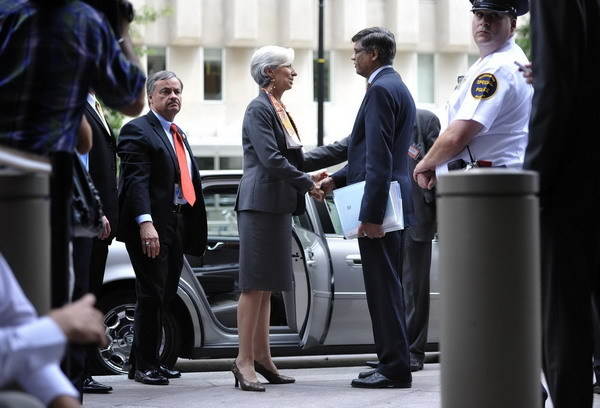Latest News
Lagarde 'exceptionally talented' for IMF: Geithner
(Agencies)
Updated: 2011-06-24 09:43
 |
Large Medium Small |
|
 France's Finance Minister Christine Lagarde (C) stops to talk to an unidentified onlooker as she departs after a day of meetings ahead of her potentially being named the next managing director of the International Monetary Fund, at IMF headquarters in Washington, June 23, 2011. The IMF top spot came open last month following the sudden resignation of Dominique Strauss-Kahn on sexual assault charges, which he has denied.[Photo/Agencies] |
WASHINGTON - US Treasury Secretary Timothy Geithner believes French counterpart Christine Lagarde is an "exceptionally talented" candidate to lead the International Monetary Fund, the Treasury said on Thursday in a statement that stopped short of an endorsement.
The French finance minister was in Washington this week to make her case to succeed Dominique Strauss-Kahn, who resigned as IMF chief after being arrested on sexual assault charges.
Lagarde is competing with Mexican central bank governor Agustin Carstens for the top job at a time when the IMF's role has become more relevant with a growing debt crisis in the euro ?zone, as well as turmoil across the Middle East and North Africa.
Geithner "believes that Minister Lagarde's strong leadership skills and experience makes her an exceptionally talented candidate for IMF managing director," a Treasury spokeswoman said after the two finance ministers met.
The spokeswoman said Geithner and Lagarde had discussed the situation in Europe, where Greece is under pressure to impose fresh austerity measures in return for a further disbursement of funds from an IMF/European Union bailout package.
Lagarde is viewed as the front runner to head the IMF, a position historically held by a European, and it is expected the United States will endorse her next week when the Fund's board votes on a new managing director.
If chosen for the job, she would be the first woman to lead the international financial institution.
She emerged smiling from the IMF headquarters on Thursday and told reporters she had outlined her vision for the fund during a three-hour meeting with the IMF executive board.
"I believe that the fund should be more responsive, certainly more effective and more legitimate, and that clearly entails many potential improvements, but also a continuation of the trend of reforms that has been undertaken by my predecessor," she told reporters.
"It is now for the membership to decide" who should head the IMF, she added.
Carstens has acknowledged he is a long-shot candidate, although he suggested that Lagarde may be too close to the European crisis to offer objective advice as head of the IMF. He has argued he would be a fresh pair of eyes on Europe's debt crisis.
Emerging countries are pushing for more say in the IMF and are trying to break Europe's 65-year hold on the fund. So far Lagarde has the backing of Europe, which controls one-third of the votes. Most of Carstens' support is in Latin America.
The United States and Japan, which have the two largest voting shares, have not endorsed a candidate. But Geithner has publicly said both Lagarde and Carstens are credible.
Carstens has a strong mixture of financial talent and political skills and that makes him an "exceptionally capable candidate" to head the IMF, Geithner said after meeting with the Mexican central banker last week.
Lagarde is due to meet the IMF's board on Thursday. On Tuesday, she held bilateral meetings with individual board directors, who represent the fund's 187 member countries.
The US Treasury is unlikely to endorse a specific candidate until the IMF board moves forward on the matter.
| 分享按鈕 |